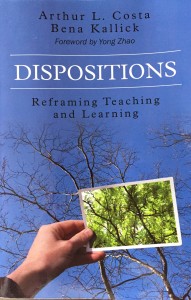Art Costa is one of the originators of the Cognitive Coaching practices that I’ve trained in for helping people move their thinking, so it was clear that when he put out a book all about Dispositions, I was dying to read it…but there’s only so much time so it took about a year before I got to it, but I’m certainly glad I did.
Costa and Kallick have identified dispositions as “tendencies toward particular patterns of intellectual behavior.” I’ve written about the dispositions of teacher leadership in previous posts, which directly stems from Costa’s influence on my work and thinking about people and their thinking over the past few years. Being aware of these tendencies and identifying them for success patterns helps us help each other…kids, teachers, principals, district administrators…spouses. It’s so useful to understand how others approach their circumstances if you wish to be an active part of the experience with them. It’s critical if you wish to help them move through the experience be it individual learning or solving group problems.
I was pleased to find this book pulls not only from Costa’s previous work in Adaptive Schools and Cognitive Coaching, but also from more recent research in social thinking, such as Malcom Gladwell’s analysis of Outliers, Carol Dweck’s research on Growth Mindset, and Paul Tough’s work on grit and perseverance. The overlap made this an easy-to-read book if you’ve experienced any of those listed.
What sets this book apart though, is that after defining dispositions and giving examples in a plentitude of ways, they go on to provide articulate steps for identifying with your group which dispositions are necessary to build up in your environment (personally or socially). Then they break a process down for exploring, defining, and building these over sustained time. It becomes apparent that the focus is quality, not quantity and learning, not knowing.
This book pulled together my thinking about individual learning patterns, positive behavior supports, and interventions to improve academics that are not content driven, but disposition-driven. It emphasized for me that teaching metacognition is one of the most important skills we can support at all levels…even adults…maybe especially adults.
I give this one 5 Sutterstars for the depth and breadth in inspires.

